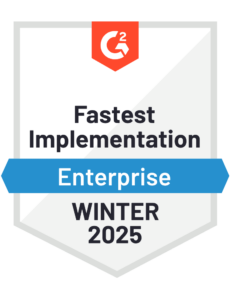What Business Leaders Must Know to Thrive In 2025
Blog post
Share
This blog was written by Trintech CEO Darren Heffernan and originally appeared on Fast Company. It is republished with permission.
Staying competitive requires more than adopting new tools—it demands foresight. Here’s how companies can seize opportunity in 2025 and beyond.
As we enter 2025, business leaders face an era of rapid transformation shaped by AI, evolving capital markets, and shifting regulations. Staying competitive requires more than adopting new tools—it demands foresight. Success will come to those who embrace innovation while predicting and preparing for future shifts.
But no CEO can make this leap alone. From executives to entry-level employees, everyone must align behind actionable strategies that empower the business to adapt. By leveraging AI, optimizing data use, and fostering agile cultures, companies can seize opportunities in 2025 instead of falling behind.
Unlock the Potential of AI
Generative AI (GenAI) is no longer just a productivity tool—it’s a business revolution. Already capable of automating a third of work tasks, its computational power doubles every six months. By 2025, this evolution will redefine how organizations operate, enabling leaders to deliver highly personalized customer experiences and new value-driven business models.
For B2B companies, GenAI has the potential to transform client relationships. As I explored previously, when implemented correctly, it has the power to take over time-consuming, repetitive tasks and enable finance professionals to focus on more rewarding and impactful work. AI is particularly beneficial in number-heavy processes such as data validation and reporting, where it reduces errors and accelerates workflows. By embracing these AI-driven efficiencies, business leaders can ensure their departments focus on high-value, strategic activities, enhancing not only output, but also job satisfaction within finance teams.
Leaders who proactively embrace AI’s efficiencies will free up their teams for forward-looking initiatives, creating a workforce ready to meet the demands of the future.
Overcome the Data Dilemma
Data issues have long hindered finance and accounting teams, from challenges in data collection and organization to a lack of tools for meaningful interpretation. The advances in AI discussed above will help address some of the existing challenges, but must be executed after a solid data infrastructure is already in place.
Businesses that prioritize building a robust data infrastructure can transform their decision-making processes. When manual, time-consuming tasks like data aggregation and analysis are streamlined, organizations can shift their focus toward identifying trends, uncovering opportunities, and mitigating risks with greater precision. Real-time insights not only enhance the accuracy of decisions, but also enable organizations to respond swiftly to market changes, gaining a significant competitive edge.
Investing in advanced tools and technology ensures that data is not just collected, but made actionable. These tools empower C-suite leaders and their teams to align strategy with real-world data, fostering a culture of agility and innovation. With timely, reliable information at their fingertips, organizations can break down silos, drive cross-functional collaboration, and position themselves for sustainable growth in an increasingly data-driven world.
Prioritize Capital Allocation
Capital—both financial and human—will become even more critical in 2025. In an environment of shifting workforce demands, organizations must evaluate funding options carefully to ensure they align with long-term goals.
A recent survey revealed that while 79% of CFOs expect net profit growth in 2025, only 51% feel confident that it will be enough to meet their goals in the new year. This underscores the need for smarter capital allocation. Businesses should focus on strategic investments that yield maximum returns, whether in technology, talent development, or market expansion.
Addressing imbalances in human capital is equally essential. The AI revolution calls for a reimagining of traditional hiring practices. Instead of rigid qualifications, organizations should prioritize adaptable skills and diverse experiences. By broadening their talent pool, leaders can build teams equipped to innovate and thrive in an ever-changing landscape.
Foster a Future-Oriented Mindset
Change within a company doesn’t happen overnight, even with Gen AI. Business leaders should start preparing for 2025 and the years ahead now by building a thorough strategy, leading by example, and hiring the right people to build a rock-solid foundation.
Strategies should include thoroughly researched KPIs meant to deliver strong ROIs. Pay attention to news and trends within your industry using mainstream media, public company filings, and government economic data. Study previous industry trends—such as the dot-com boom—and how they have unfolded to stay ahead of the competition.
Communicating your strategy effectively is just as important as your strategy itself. At least three times a year, I meet with my executive leadership team for several days to discuss the shifts they are seeing in their respective sectors and collaborate on what success will look like in the new year and beyond. This deep dive allows us to create a viable plan with definitive roles, careful experimentation, and regular touchpoints to ensure we can pivot if and when we need to.
As any good leader knows, an entire organization must buy in to affect any real change. Innovation starts from the ground up. Reevaluate your talent strategy based on new priorities and KPIs, and ensure that all employees are trained extensively on new models and technology, both in their use cases and their regulations and limits.
Lead the Way In 2025
The most successful leaders in 2025 won’t just react to change—they’ll drive it. By harnessing the transformative power of AI, mastering data-driven decision-making, and fostering a culture of agility, business leaders can reclaim their time for the strategic initiatives that fuel growth.
In doing so, they’ll not only maintain a competitive edge, but redefine what it means to lead in a world of rapid technological advancement. For those ready to adapt, the opportunities of 2025 are boundless.
ABOUT THE AUTHOR
Darren Heffernan, CEO, Trintech, has spent over 30 years in finance and operational roles driving innovation in the technology space.







